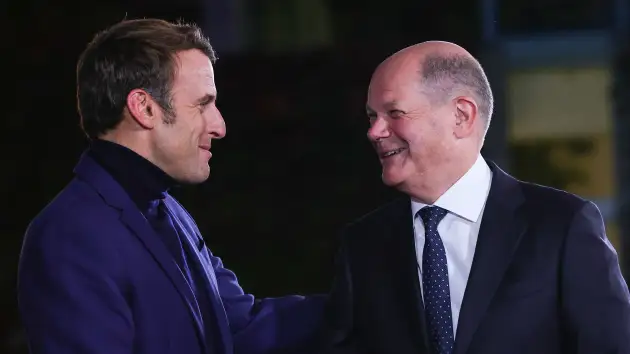France and Germany’s relationship questioned as Scholz goes alone on policy
CNBC – Fresh tensions between France and Germany are challenging their relationship at a time when their unity is critical for broader European policy in tackling the energy crisis.
Germany has been criticized for approving a 200 billion euro ($200.2 billion) rescue package.
French Finance Minister Bruno Le Maire said in the wake of this plan that the euro zone needed to work together and avoid fragmentation among the 19 countries that share the common currency.
French officials have denied any sort of tensions, but they have acknowledged that Germany’s three-party coalition makes any sort of agreement slower to achieve.

Omer Messinger | Getty Images News | Getty Images
Fresh tensions between France and Germany are challenging their relationship at a time when their unity is critical for broader European policy in tackling the energy crisis.
The leaders of the two nations will meet in Paris on Wednesday, but this encounter almost got canceled.
It was initially meant to be a broader discussion including government ministers, then it was announced it was being postponed, and eventually, it was transformed into just a meeting between the two heads of state.
The Franco-German’s historical commitment to close cooperation seems questioned, or at least challenged, today.
Alberto Alemanno, professor of EU law at H.E.C Business School, told CNBC via email
He added that the action of German Chancellor Olaf Scholz is “creating the deepest divides within the Union.”
France and Germany are the two largest economies in the European Union and two of the founding nations of this political grouping. Their unity is essential for EU policymaking.
France and Germany have had their differences over how to tackle the energy crisis. While, for example, France defended a cap on European gas prices, the German government only agreed to do so last week — and with several conditions attached.
Germany has also been criticized for approving a 200 billion euro ($200.2 billion) rescue package looking to support German companies and families while blocking steps at the EU level to raise more money and support European nations with less fiscal room.
French Finance Minister Bruno Le Maire said in the wake of this plan that the euro zone needed to work together and avoid fragmentation among the 19 countries that share the common currency.
In addition, there are concerns in the broader EU about Scholz’s upcoming trip to China and for looking to do business with a nation that is increasingly deemed as a rival to European countries. There are also issues with Germany’s long delay in delivering weapons to Ukraine.
“The relationship is obviously strained, a development I blame mostly the German government for,” Jacob Kirkegaard, senior fellow at the German Marshall Fund think tank, said via email.
“Scholz leads the first three-party coalition in German history, and as such has less control over his ‘domestic politics’ than previous German chancellors on top of having ideologically often opposed coalition members in the Greens and FDP,” he added.
‘Blown out of proportion’
French officials, however, have denied any sort of tensions, but they have acknowledged that Germany’s three-party coalition makes any sort of agreement slower to achieve.
“This has been blown out of proportion,” a French official, who did not want to be named due to the sensitivity of this issue, told CNBC about the tension between Paris and Berlin.
The changes to the original gathering have been linked to calendar issues, with German ministers reportedly arguing this was a good week for holidays with their families. Le Maire said the postponement had “nothing to do with any kind of political difficulties,” according to Politico.
The same official added that sometimes both countries move “more slowly” on policy than what would be desired, but “we are always discussing with the Germans.”
Nonetheless, they added that the German coalition, in place since December, is relatively new and “there is a learning curve there.”
“It takes a lot of time for them to find a common position,” the official said.
The German government was not immediately available for comment when contacted by CNBC.
Scholz said last week that “as far as cooperation with France is concerned, President Macron and I meet very, very often.”
Analysts at political risk consultancy Eurasia Group have also noted that “frustration with Berlin has grown” across Europe.
“While the criticism initially centered around what was perceived by many senior EU officials as Berlin’s limited military support for [Kyiv], member states across the board have now started to criticize Germany’s fiscal and energy policies too,” they said in a note Tuesday.
“Disappointment with Berlin has now gone so far that it actually risks weakening the Franco-German alliance—the EU’s single most important bilateral relationship,” they added.